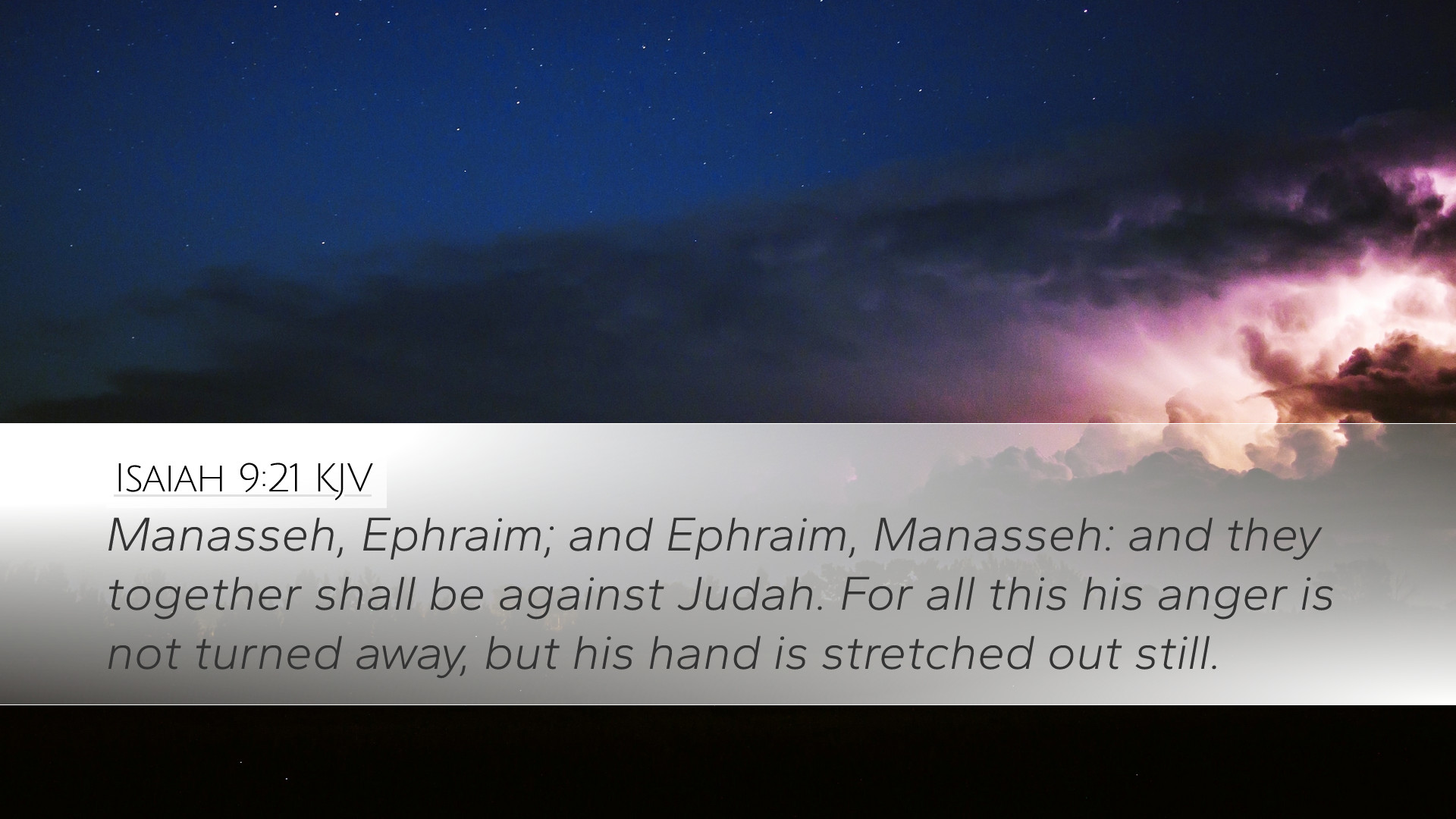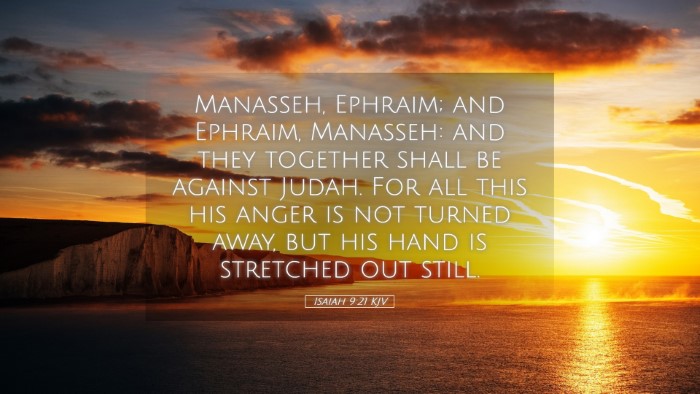Commentary on Isaiah 9:21
The verse Isaiah 9:21 states:
"Manasseh, Ephraim; and Ephraim, Manasseh: and they together shall be against Judah."
This passage offers significant insight into the socio-political and spiritual context of the time. Below, we summarize insights from various public domain commentaries to provide a comprehensive understanding of this verse.
Historical Context
Matthew Henry emphasizes the tumultuous period in which Isaiah prophesied. The division of the tribes of Israel into the northern kingdom of Israel and the southern kingdom of Judah had resulted in considerable strife. This prophecy highlights the conflict not only between the kingdoms but also the internal rifts among the tribes themselves. Manasseh and Ephraim were the prime tribes of the northern kingdom, and their opposition to Judah signified a deeper spiritual malaise.
Albert Barnes points out that this verse reflects a state of disunity among the Israelites. The reference to Manasseh and Ephraim, traditionally seen as brothers, illustrates the severity of their conflict, hinting at fraternal betrayal. This division, he argues, not only impacts political alliances but also has implications for their worship and relationship with God.
Spiritual Symbolism
The use of the names Manasseh and Ephraim is highly symbolic. Adam Clarke notes that these tribes represent the larger group of Israel and their rebellion against divine authority. They personify the disobedience and idolatry that had taken root in the northern kingdom, diverging from the covenantal obligations that God required of His people.
Political Implications
This verse also serves as a prophetic warning. According to Matthew Henry, it indicates a growing conflict that would lead to disastrous consequences for the nation. The infighting among the tribes foreshadowed impending judgments that would come as a result of their failure to uphold God's commandments.
- Division among Allies: The phrase "Manasseh, Ephraim; and Ephraim, Manasseh" underscores the complete breakdown of trust, suggesting that former allies would turn against one another.
- Judah's Role: The mention of Judah emphasizes that the southern kingdom is not exempt from these judgments; they, too, are embroiled in the consequences of Israel's infidelity, facing retaliation from their own brethren.
Theological Reflections
Albert Barnes articulates that this verse presents a stark reminder of God's judgement against sin. The hostility illustrated in this verse serves as a physical manifestation of spiritual separation from God. The tribes' conflict against each other serves as a portent for greater doom unless there is a concerted return to faithfulness before God.
Adam Clarke suggests that this prophecy denotes not only the present struggles but also an eschatological perspective on the eventual restoration and unity that comes through Messiah. The tensions of the tribes prefigure the greater reconciliation that God will accomplish through Christ, in which Jew and Gentile alike would be made one.
Applications for Today
In contemporary application, pastors and theologians can draw lessons from Isaiah 9:21 regarding unity and division within the church. This scriptural backdrop serves as a cautionary tale:
- Call to Unity: Just as divisions among the tribes led to collective downfall, disunity within the body of Christ undermines the church's testimony and effectiveness in the world today.
- Importance of Covenant Faithfulness: The call for faithfulness to God’s covenant promises remains as pertinent today as it was in Isaiah's time. When the church loses sight of its foundational truths in Christ, it risks the same spiritual disarray that Israel faced.
- Hope for Restoration: Despite the grim nature of the prophecy, there lies a promise of hope. Just as Judah had the opportunity to turn back, modern believers are encouraged to seek reconciliation and restoration through Christ, the ultimate Prince of Peace.
Conclusion
Isaiah 9:21 serves as a complex tapestry of historical reality, prophetic warning, and theological richness. As evidenced in Samuel, Matthew Henry, Albert Barnes, and Adam Clarke's commentaries, it challenges both the original audience and contemporary readers to reflect on the imperatives of unity, faithfulness, and the promise of redemption. Understanding this interplay can enrich the preaching, study, and application of God’s Word in current times.


